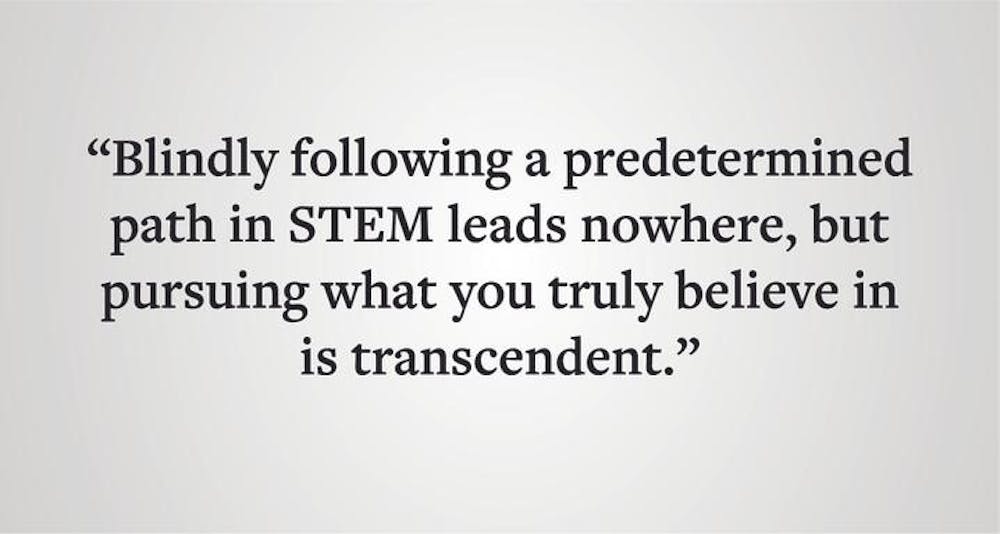When I applied to Brown, I was enamored by the promise of the Open Curriculum. As an indecisive learner with far too many interests, I saw Brown as a perfect fit — an academic playground where I could explore freely. However, within my first year, my idealized expectations quickly unraveled. As an international student, I discovered that this supposed freedom was not without its limits: Immigration policies and job market constraints reinforce the idea that the humanities are a luxury that international students cannot afford. Though there is pressure to choose STEM, this choice often comes at the cost of true intellectual fulfillment. The humanities remain worth pursuing, despite systemic obstacles, because they cultivate the resilience necessary to overcome them.
For many foreign students, choosing a major is more than a simple matter of passion, it is a decision tied to post-graduation visa restrictions. While those graduating with a STEM degree are awarded three years of post-graduation work authorization, those in the humanities are only eligible for a single year. From the moment that I expressed interest in the humanities, I was met with skepticism. These constraints burden nearly every international student who seeks to immigrate to America and influence many to prioritize visa-compatible majors and career paths over their true intellectual curiosities. After all, a single year out of college is no time at all. What meaningful career foundation can a recent graduate lay in just 12 months?
To alleviate these anxieties, many internationals opt for STEM degrees, an unsurprising choice given a labor force where STEM majors have a clear advantage post-graduation. Not only do STEM fields offer higher salaries, but they also provide more job opportunities compared to the humanities. This disadvantage is especially apparent in the choices of many Brown students where, in 2022, 40% of graduates concentrated in some combination of economics, applied mathematics, and computer science.
The STEM visa extension seems especially promising in the current political climate. While President Trump has previously made vague promises of green cards for international graduates, no serious measures have been taken to date. Still, the echoes of his last administration remain in the memory of international students: Changes to H-1B visas — the work visas many international students require post-graduation — favored higher international wage earners, and visa denial rates reached 24% in 2018, as opposed to a mere 2% under the Biden administration in 2022.
The uncertainty is so great that institutions like Brown urged all international students to return to Providence before President Trump’s inauguration. If American universities cannot even anticipate what’s coming, how can we? Choosing STEM may seem like the safest option with a structured, well-planned, three-year trajectory, but if we can’t predict the next few months, let alone the next several years? How tangible is that security? Instead, this uncertainty is something we must learn to bear.
International students cannot secure just any type of job if they want to extend their time in the United States. The ideal job must both accept foreign workers’ applications and be willing to sponsor a graduate once the three initial years are up. These jobs are exceedingly rare and concentrated among a few firms: the top 30 H-1B employers account for 40% of the annual cap of 85,000 visas. They exist primarily in specific, well-paid industries, such as finance and tech, and are largely concentrated within major corporations where positions are extremely limited.
The select few who reassert their commitment to the humanities may seem to be doing so with little security and a daunting path ahead. For many international students, returning home — where humanities careers can face even greater challenges — might become a reality, yet they remain unshaken.
Yes, of course, the humanities are worth it. Despite a less-than-linear path ahead, students should hold firm, not out of naivety, but because passion and dedication are important. Blindly following a predetermined path in STEM leads nowhere, but pursuing what you truly believe in is transcendent. Moreover, humanities degrees from institutions like Brown can lead to successful careers, providing graduates with invaluable analytical skills that are highly valued across industries. Clinging to the illusion of control that STEM offers may seem pragmatic, but what is security without purpose? The humanities demand resilience, but in return, they offer something far more valuable: meaning.
For international students, staying in the U.S. means navigating an inherently exploitative immigration system. Instead of chasing the illusion of security in a system that will never guarantee it, we can embrace the risk of being true to ourselves.
Julia Barrozo ’26 can be reached at julia_barrozo_do_amaral@brown.edu. Please send responses to this column to letters@browndailyherald.com and other opinions to opinions@browndailyherald.com.





